Frosty situation on skin
Senior Priyanka John looks out the window and sees the snow falling to the ground and feels her dry skin, which has been irritating her since the winter started. She goes into her pantry to gets a big tub of coconut oil and applies it on her face in the hopes that it will help hydrate her skin. John grunts out of frustration because she has tried everything to help her skin, but nothing will do the trick. She says it is a constant struggle dealing with her skin in the winter because her skin dries out, breaks out more frequently, and her lips are constantly chapped.
Like John, many Mercy girls struggle with their skin — not with breakouts in the winter, but also with flakey, red, irritated skin. It can be frustrating coping with the effects of cold weather, since sometimes it feels like moisturizer and chapstick is not enough to take on the battle.
Acne breakouts are often increased in the winter because the skin is getting dried out by external factors, which can lead to a build-up of dead skin that clogs pores, according to an article by The Skin Edit. A way to combat dry skin is to use a mild scrub to gently wipe away dead cells from the skin’s surface.
Dealing with dry skin in the winter can be a pain. According to an article by Johnson and Johnson Pharmaceutical company, humidity levels drop in the winter, which means the air is drier. Dry air sucks moisture from the skin, which leads to dryness, flakiness, and cracking in the skin.
“My skin is so dry in the winter,” said sophomore Chloe Kilano. “I have not been able to find a solution for my flakey skin.”
Johnson and Johnson pharmaceutical company recommends investing in a humidifier to keep air moist and help keep your skin from drying out. A cheaper alternative is to place a few bowls of warm water near a radiator to keep the air moist. Also, it is crucial to drink lots of water in order to keep your skin hydrated.
“I wish my skin could go into hibernation in the winter,” said senior Lorane Assofi. “My acne and eczema goes crazy.”
According to healthline.org, eczema flare-ups are much more common in the winter due to the air being drier than normal. Eczema is a skin condition that causes red, inflamed skin, which becomes very dry. Symptoms include severe itching, dry patches, bumps, cracked, scaly skin, and sensitive skin. People often struggle from eczema in the winter because the skin can’t stay moist on its own. Also, wearing heavy layers of clothing, taking hot baths, or using too many bed covers can cause eczema flare-ups as well, which are things you are more likely to do in the winter.
Assofi says that her eczema gets so bad in the winter, that even her eyelids are affected. She says that her eyes become inflamed and her eyelids get dry and scaly.
Steroid-based creams can be applied directly to the eyelids to help treat inflammation. Also corticosteroid creams, solutions, and obtener are best to help treat eczema all over your body, according to WebMD.
Chapped lips are also very common in the winter because cold air is not able to hold moisture well. One solution to this is lip balm and petroleum jelly because it helps seal moisture against your lips. Cold sores on lips are also much more more common in the winter because cold weather tends to reactivate the HSV-1 virus, according to Abreeva. Outbreaks are more common in the winter because less vitamin D in the bottom can increase a person’s risk of developing a cold sore.
Adapting to the effects of cold weather on the skin can be hassle, but it is important to adjust your routine to avoid dryness, breakouts, and more. Moisturizers and creams are crucial in the winter. However, if it feels like nothing you do is helping your skin, seeking help from a doctor or dermatologist can help tremendously.

